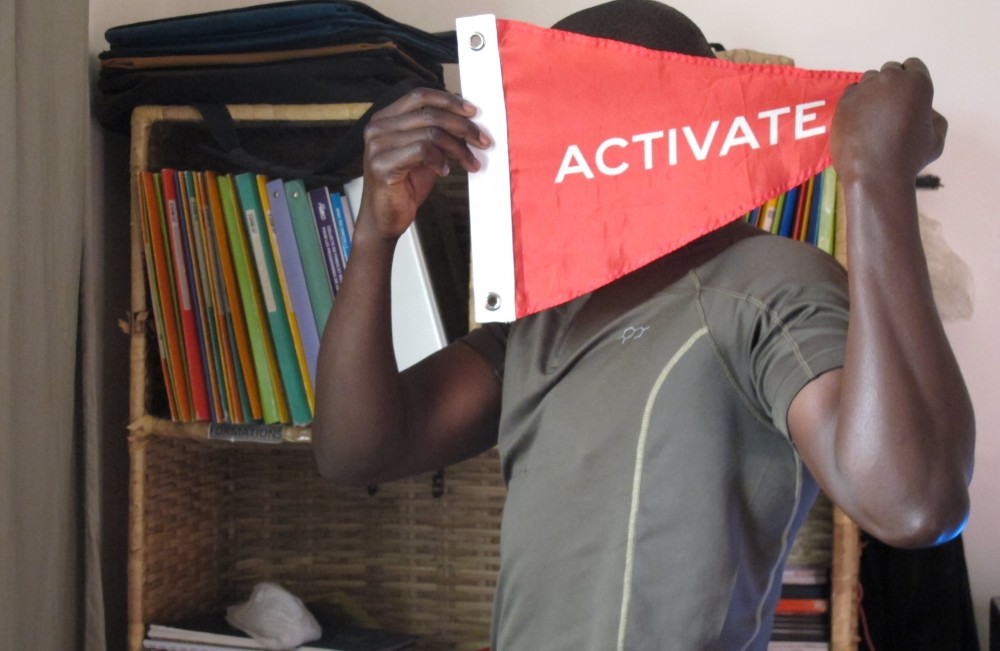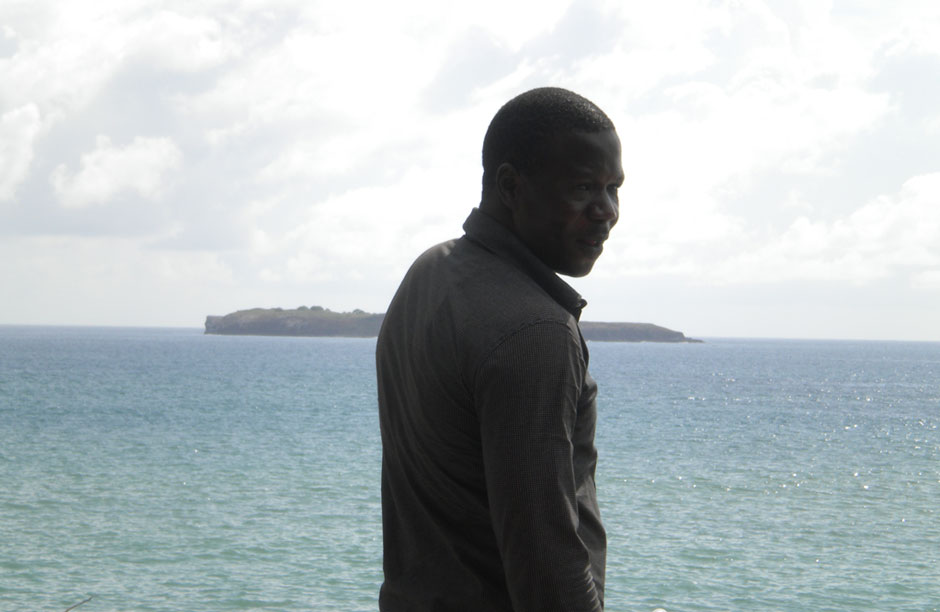PAST ISSUES
 Souleymane in his apartment in Dakar, Senegal with our Activate flag. He is covering his face to protect his identity.
Souleymane in his apartment in Dakar, Senegal with our Activate flag. He is covering his face to protect his identity. portrait of Souleymane taken in Dakar.
portrait of Souleymane taken in Dakar.
Taking on a Taboo
By Amanda FortierIt’s not everyday that one meets a martyr, a person so fiercely driven by a cause that they are willing to give it all up for the battle. I stumbled across one such person at a maximum-security prison in Dakar recently. Souleymane* is a Senegalese action hero, a trailblazing pioneer in an ardent quest to help thousands more like him in the small West African nation of Senegal. He’s a gay AIDS activist, formerly imprisoned for his sexual orientation, and fighting to protect the basic human rights of gay men across the continent. Senegal, a country of roughly 13 million, may have one of the lowest rates of HIV in Sub-Saharan Africa, at less than one percent, but the most vulnerable group is men who have sex with men (MSM), at over 22%. In a country where 95% of the population is Muslim and homosexuality is considered taboo, Souleymane’s crusade runs counter to longstanding cultural and religious beliefs. It’s not an easy road. But he’s not giving up.
The first time I met Souleymane I had no idea who he was. He was speaking, in the local Wolof language, to a group of prisoners about AIDS awareness and prevention – unbeknownst to me at the time, these men were also his former fellow inmates. I could only get bits and pieces of what Souleymane was saying, but it was obvious he was passionate about the topic and the prisoners were listening attentively. Perhaps they had good reason to.
Around the world, HIV rates in prisons are often much higher compared to the general population – sometimes nearly double the rate. This is often due to the high incidence of drug use, sexual relations and violence. Combined with a lack of adequate preventative measures, such as condom distribution or needle exchange programs, prisoners live in a highly vulnerable environment.
“Everyone knows, whether we admit it or not, that there are sexual relations among men in prisons,” affirms Souleymane in French. We are sitting in the privacy of his apartment in the outskirts of Dakar later that evening. “I won’t say I witnessed rapes, but nearly every day there were two or four people sent to the police because they were caught having sex in the night. And yet for us – those who admit to being homosexuals – we were never caught doing such things, because it’s not our place to do so in prison.”
Souleymane and eight other men were arrested on the evening of December 19, 2008, while holding a private AIDS awareness meeting in their home. Policemen stormed through their door, allegedly beating, torturing and insulting the men for “engaging in homosexual acts”. Souleymane and his partners were kept for five days in solitary confinement before being tried and sentenced to eight-years in jail.
It wasn’t long before international aid groups intervened and the men were released after serving only four months. During their first two months in jail, which were spent at Reubeuss prison, one of the most notoriously decrepit and overcrowded detention centers in Senegal, Souleymane says they endured a lot of suffering and humiliation.
“(At Reubeuss) I was in a cell with 106 people and experienced complete and utter rejection,” Souleymane recalls. “We only had two free hours a day to be outside, so the other 22 hours we were locked up. Can you imagine being in a cell with 106 people and no one would touch or even talk to you? But we managed to remain comfortable in our own skin, because we know we didn’t choose to be they way we are and that we shouldn’t have to justify it to anyone.”
Since his release, Souleymane says his battle has become so much harder that he would actually prefer returning to prison.
“At least there my life wasn’t in jeopardy,” he says.
Since the barrage of media attention following his arrest, Souleymane’s face has been splashed across newspapers and television screens around the country. He has since been kicked out of his home, disowned by friends and family, and repeatedly forced to move apartments when landlords discovered his identity. He has also been beaten up four times in broad daylight, ostracized on public transportation, and relegated to a stealth life minimized to just work and home.
“There are people who tell us we should just leave Senegal. But why?” demands Souleymane. “We are citizens like everyone else here. If we go to Europe it’s because there is freedom and tolerance over there. And if there is tolerance over there its because they have fought for this. We are not going to go benefit from this tolerance, because we need to try to build the same thing here in Senegal. Our government has signed all the Human Rights conventions, but what does this mean if it’s not respected? We don’t need them to shake our hands or to say hello, we don’t need their love – they can keep it all for themselves. But that doesn’t keep us from living. They didn’t create us, but they must respect us, and that’s what we are fighting for.”
* Souleymane’s real name has been changed to protect his identity.
